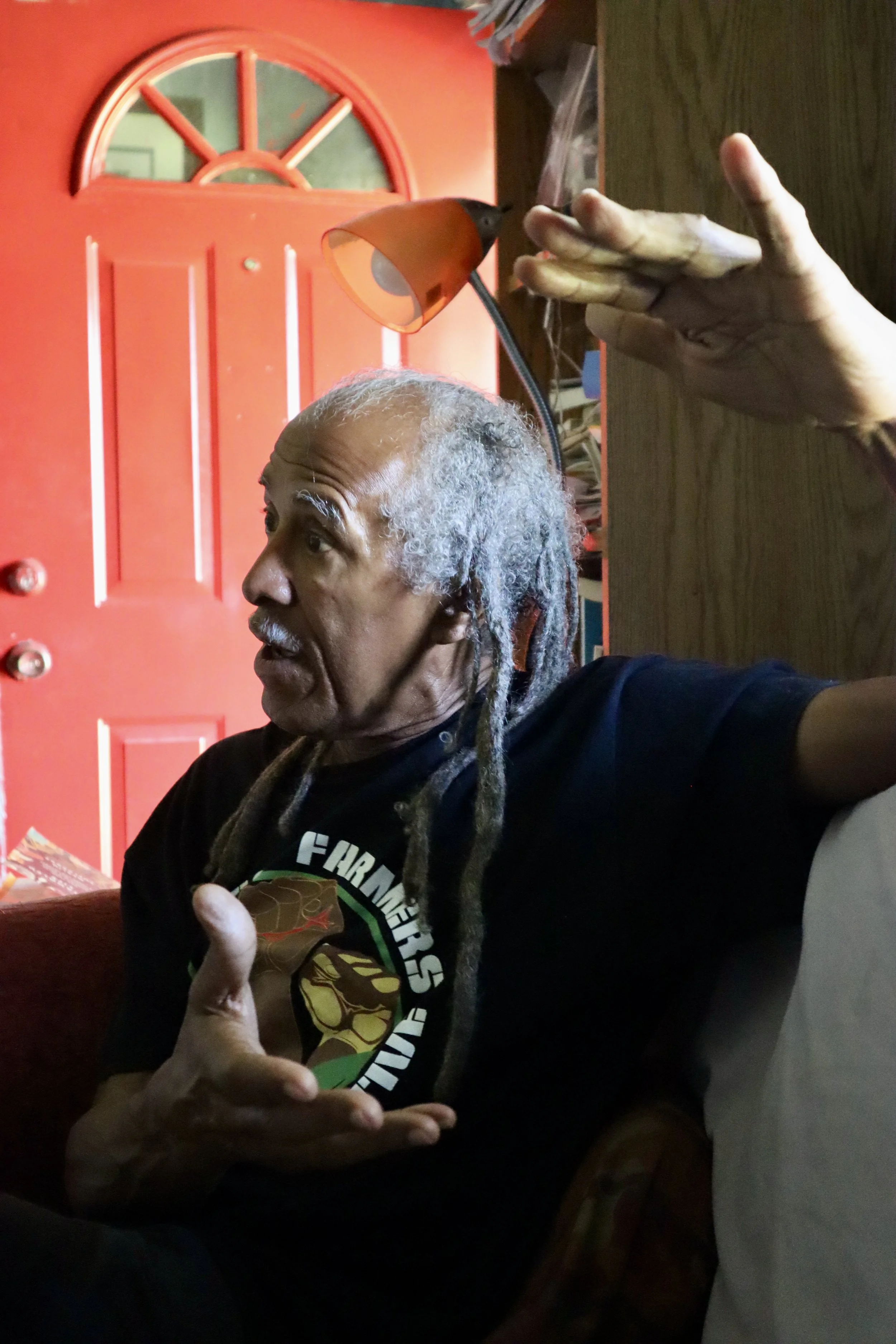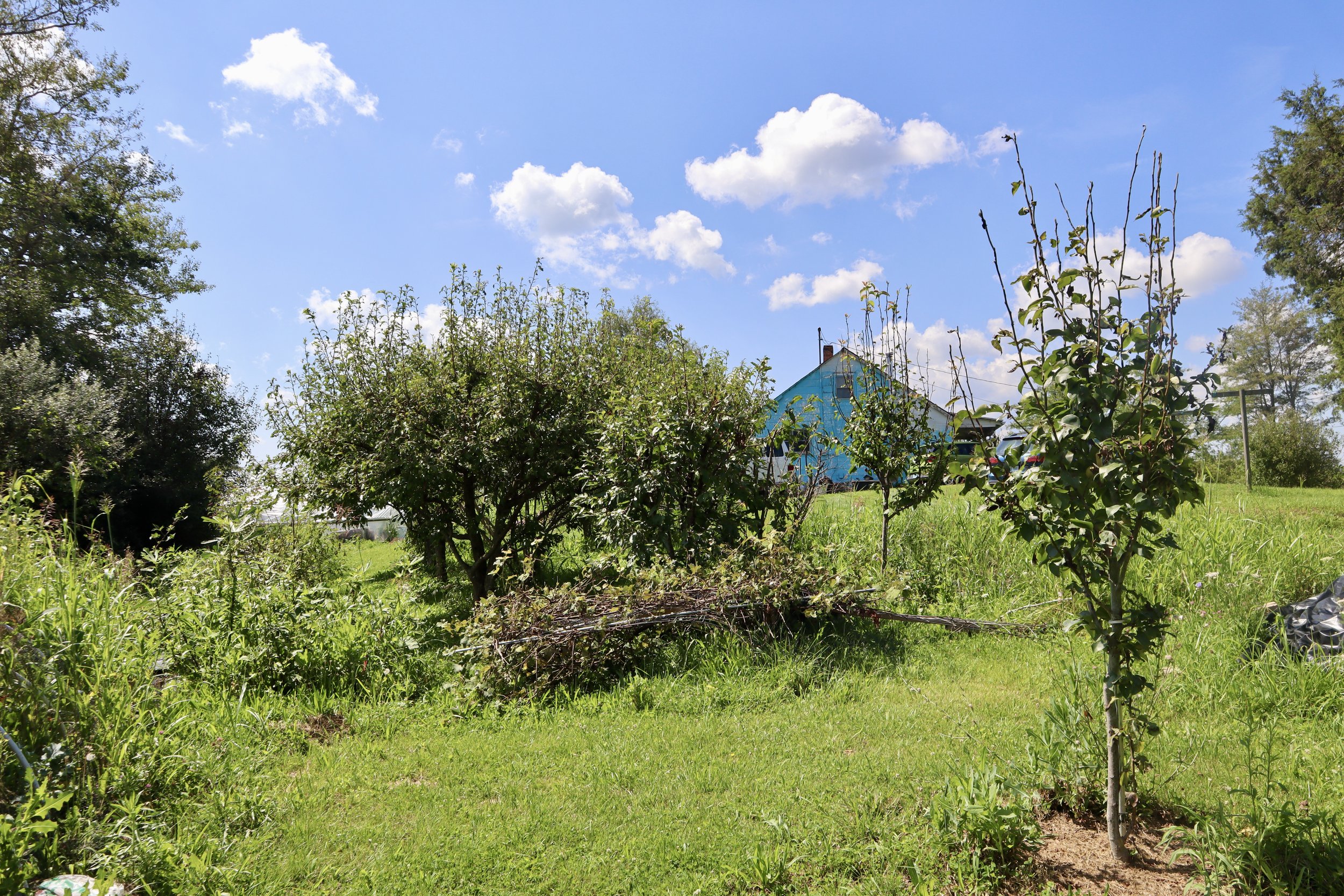The Seer of Frogtown
story by Donna Hecker & photography by Talitha Schroeder
In rural Madison county, on a narrow country lane, sits a small house with blue shingles dappled white from a recent hailstorm. Just beyond the front porch is a little fish pond inhabited by a family of frogs and a gurgling fountain.
Jim Embry calls it his refuge. “I might have dinner out here. With a little table and a bottle of wine. The frogs will hop out of the water and sit about a foot away.” He says it’s hard to leave for the bright lights of Lexington when the stars overhead are so brilliant.
But every community needs a conscience. Someone to nag and nudge us toward our better selves. And for over 50 years Jim Embry has been a voice for the unseen, the unheard and the unvalued. He exhorts us to take our blinders off and look at the world in its entirety, to see what we’ve been missing, and to be intentional about it.
Earlier this year, Jim Embry received a James Beard Leadership Award for his work as the founder of the Sustainable Communities Network, a member of the administrative team of the Ujamaa Cooperative Farming Alliance, and as a seven-time Slow Food delegate from the United States.
Jim says we can all learn from the Beard Foundation’s own experience in 2020-21, when it came under fire for lacking diversity. “They were roundly criticized and righteously so, and went through a period of denial, defensiveness, and introspection. And began to reevaluate their own intentionality and recognize that what they were criticized for was very accurate. And once you understand that, your event can be even more powerful, because you’ve opened it up.”
It’s a lesson he’s spent years trying to teach. “If you view life like a horse with blinders on, you’ll go through it with 45 or 90 degree vision and you’re supposed to have 360. You’ll only see folks you normally see – not those you have to make a greater effort to see – and you can say it wasn’t intentional.”
Much like James Beard himself, Jim’s worldview widened when he moved to New York City as a teen to work construction for a while. “I’m on the subway. I’ve barely heard any English. Everybody’s speaking different languages – Yiddish, German, Italian, African languages. It just opened up my perspective. In Kentucky, we grew up with a narrow lens. And we often accept being last, except maybe in sports.”
“If you close down all the sports, life’s still gonna go on. But if you shut down all the farmers and the agriculture and restaurant workers, people are gonna have a problem. Food is essential to life. And we treat it like it’s a stepchild.”
Jim sees the Leadership Awards as both an affirmation and an opportunity for Kentucky to lead in food justice and sustainability. Fellow Kentuckian Valerie Ison Horn also received a James Beard Leadership Award for her work with CANE Kitchen, the Cowan Community Center and the Whitesburg Farmers Market, especially in the wake of Eastern Kentucky’s 2022 floods.
“Here are six people, two from Kentucky, who were given awards for work in food justice and Lord knows we need a lot more justice. We have a chance to really educate Kentuckians and say we support food justice in Kentucky. And three of us are seed people. Are seeds important? Well, how do we build community resilience? We talk about solar, green design, all kinds of things but hardly ever about seeds. Seeds are the foundation of community resilience. Seed-saving is what will help us contend with climate change.”
In Jim’s telling, it’s a question of what and whom we value. “For 250 years, our food (supply) was based on taking land from indigenous people and stealing labor from enslaved Africans. So we undervalue it. The same way with teachers. We pay teachers a minimum amount of money. But educating our kids is one of the most important functions in society. And as I’ve said three times today already, food is essential.”
When Jim and a group of like-minded friends founded Lexington’s Good Foods Co-op back in 1972, they were focused on three types of food – healthy food, local food, and organic food. Jim believed then, and still does, that their focus would lead to social transformation, promoting “common health for everybody” over the “commonwealth of a few.”
He concedes we have a ways to go. “We think we know what it means to be human. But we’re a young species; we’re the new kids on the block. How I look at it, we’re maturing. And part of that maturation is these growing pains.”
“But it all comes from how we regard the earth and the land. Soil is sacred; it’s a medium that becomes part of us, not a resource to be exploited. So everybody has to begin to think differently.”
Before we left, Jim showed us around his small farm, part of land that’s been in his family for years. A vegetable garden grown wild during his recent absences. Banks of beehives. A research pasture reseeded with grasses, annuals and perennials for habitat and forage. And a row of fruit trees, planted each year on Jim’s birthday by his children and theirs.
Jim had one final piece of advice. “Everybody should grow something. Everybody should compost. The earth thrives on different principles and one of them is reciprocity.” To which we would add that good turns, like those of Jim’s lifework, really do make the world go round.
Related Content
Three Sisters Succotash
In honor of Jim Embry’s work on sustainability, we coaxed a recipe for Three Sisters Succotash out of Honeywood Chef Cody DeRosett. We took a few liberties with Chef Cody’s recipe but you can enjoy his version at Honeywood during Lexington Restaurant Week.
© 2023, Holly Hill Inn/Ilex Summit, LLC and its affiliates, All Rights Reserved





